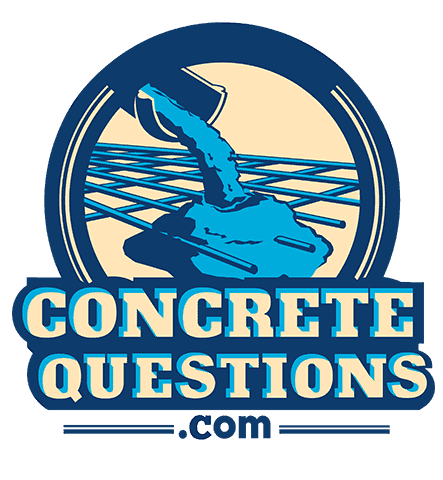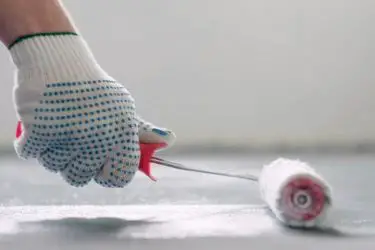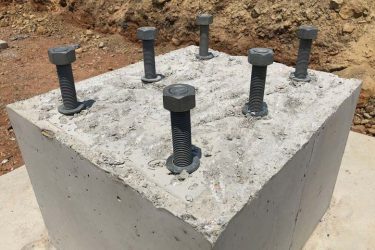Mud, dirt, or oil stain can dirty the surface of a concrete driveway, and in time, the driveway can deteriorate and become unattractive. While sweeping off dirt and dust from a driveway is easy, cleaning off stains is not. A pressure washer is usually used to clean concrete driveways, but there are alternatives, too.
To clean a concrete driveway without a pressure washer, use household items, chemical cleaners, and plenty of good scrubs. Products like trisodium phosphate, bleach, even coca-cola can get the job done. There is no need for a pressure washer if you don’t need to clean your driveway often.
While a pressure washer can save you time and energy, cleaning your driveway the old-fashioned way is good exercise. Let’s detail what a pressure washer is and why people use it, and how to clean a concrete driveway without a pressure washer if you don’t have one.

Table of Contents
What Is a Pressure Water?
Pressure washing, or power washing, is a cleaning method used for removing loose paint, grime, dust, mud, mold, chewing gum, and even the toughest stains using high-pressure water spray from objects like buildings, vehicles, and concrete surfaces. A pressure washer’s volume is measured in gallons or liters per minute. The pressure washer’s pressure, on the other hand, is measured in pounds per square inch, pascals, or bar.

A pressure washer can produce from 750 to 30,000 psi or more. Since pressure washers are not all equal, getting a pressure washer strong enough to remove old stains is essential. Pressure washers are favored by many because they are convenient and practical.
Many pressure washers have an automatic shut-off valve designed to prevent unnecessary water flow during washing. The automatic valve is indeed useful as it prevents water wastage and your water bill from increasing. Such an innovative feature has saved people up to 70 gallons of water for every 10-minute car wash.
Why a Pressure Washer Is Not Always the Solution
Pressure washers are great, but they also have their downsides. First of all, they are expensive. If you don’t own a pressure washer, that’s fine because there are several reasons why you might not want to use a pressure washer every time you need to clean your concrete driveway.
Your concrete driveway can get dirty from mildew, burn marks, oil stains, grease, and so on now and then. While you must keep your driveway clean, you don’t always need to clean your entire driveway using a pressure washer. A pressure washer is great, but its power can be overwhelming on concrete, especially when you often clean your concrete driveway.
Pressure washing accelerates the wear and tear of concrete, which is not good at all because you will have to fix your concrete driveway sooner than expected.
You want to choose the cleaner that suits your needs, so if there is no need for heavy-duty cleaning, there is no need for a pressure washer.
After cleaning your concrete driveway, it would be good practice to seal your concrete. Sealing your concrete will protect your concrete. You will also have an easier time cleaning your concrete next time.
Types of Cleaners To Use
When you look for a cleaner to clean your concrete driveway, you want to look at four types of cleaners:
- pH neutral
- Acidic
- Alkaline
- Enzymatic or bacterial
pH neutral cleaners are mild cleaners that are easy to find and can be used on the lightly soiled exterior.
Acidic cleaners are suitable for exterior use, and they are useful for removing dirt, stains, rust, and so on. You have to use acidic cleaners with caution.
Alkaline cleaners are used for removing oil and are used after the application of harsh acid cleaners — you want to neutralize your concrete’s more natural alkaline pH.
You can use enzymatic or bacterial cleaners for both interior and exterior use. Enzymatic or bacterial cleaners are excellent for cleaning bird poop, animal urine, or mold.
Can You Clean a Concrete Driveway Without a Pressure Washer?
You can clean a concrete driveway without a pressure washer; you can use your hands, some cleaning products, and tools. Cleaning this way will take more time and energy, but at least you’ll get to work on those muscles! Not everyone has a pressure washer— it is expensive — so it is good to know that you can keep your driveway clean even without it.
How to Clean up Oil Leaks Without a Pressure Washer?
Sometimes oil leaks from car engines, causing oil patches to form on concrete driveways surfaces. If you have got grease or oil stains on your concrete driveway, you should wipe it as soon as possible. The best way to remove the remaining oil after wiping is by applying sawdust to the spots.
Sawdust is the wood industry’s by-product, sometimes called “wood flour.” Vegetable oil molecules are used to modify sawdust, making it a useful oil absorber and water repellant. You can always see sawdust used in workshops because sawdust is a super multi-purpose sponge.
What you’ll need:
- Sawdust
- Deck brush
- Washing soda
- Garden hose
- Water sprayer
- Hot water
- Bucket
Use sawdust enough to cover the oil stains and let it sit for 12 to 24 hours. The longer, the better because the sawdust can absorb as much grease as possible. Take a broom or brush to sweep off the sawdust, then dispose of it.
Always get rid of sawdust responsibly. Sawdust is flammable; sawdust with oil stains is even riskier. You want to sweep the rest of the concrete driveway surface and any cracks so that dirt from the cracks will not run down the driveway when you wash it.
After sweeping the driveway clean:
- Use your garden hose sprayer to spray the driveway.
- Add one gallon of hot water to a bucket and dissolve 2 ½ ounces of washing soda.
- Use a deck brush to scrub the driveway’s stains using hot washing soda water; rewet the brush as needed.
Scrub as vigorously as you can. Then, rinse the driveway using clean water. Avoid rinsing the water to the grass as this can damage the plants.
Tips: Instead of sawdust, you can use kitty litter. You can also use a dish detergent instead of washing soda to clean the concrete driveway. You may want to use kitchen towels to remove as much oil as possible from the surface before pouring in the sawdust.

Or you should just use a product made for removing oil stains, like the popular Oil Eater Original Cleaner/Degreaser (link to Amazon).
Use Trisodium Phosphate as an All Purpos Heavy Duty Cleaner
Sometimes there are rust stains and acorn stains on the driveway that have been there too long; it will take more effort to clean. A problem like this calls for reliable pressure water. It may not be a huge problem if you do not own a pressure washer, though.
Another way to clean a concrete driveway without using pressure water is by using trisodium phosphate cleaners.
This TSP Trisodium Phosphate All-Purpose Cleaner from Sunnyside is used for everything from garage floors to cleaning used paint brushes. It can remove stains and grease very well. This inorganic compound is highly soluble in water and produces an alkaline solution.
Trisodium phosphate is commonly used in heavy-duty cleaning, which is why many cleaning professionals use it for removing the toughest grease grime, soot stains, or chalk paint from floors, walls, or woodwork.
You can also use trisodium phosphate with bleach to get rid of mildew and its stains. Due to its strength, trisodium phosphate cleaners make a perfect solution for replacing pressure washers.
Follow these steps to clean a concrete driveway without a pressure washer:
- Mix trisodium phosphate with warm water.
- Using a deck brush, scrub the driveway surface thoroughly and rinse it with water.
- If the stains do not come off quickly, mix some muriatic acid with water and apply it to the stains. You must add acid to the water, not the other way round.
- Scrub the surface.
- After scrubbing, allow the mixture to sit for about 15 minutes. You can add kitty litter to it to absorb the stains.
- Rinse with clean water.
- Once cleaned, apply a clear concrete sealer to your driveway surface. A high-quality concrete sealer can block up to 99% of surface moisture, and the coating can last up to 5 years.
Always wear gloves when handling these chemicals, especially when working with the acid solution. Do not let any acid get on your skin or clothing. When rinsing off the scrub stains, do not rinse the water to the grass to protect plants.
You should not also put acid in a metal bucket or container. That is because the acid may corrode the metal bucket or container. It would be best to use a plastic bucket or container.

If you instead want something safer for the environment you should try this Phosphate free TSP Substitute from Sunnyside instead.
Use Bleach to Remove Stains, Dirt, and Grime off Your Concrete Driveway
You can use a solution of bleach mixed with water to remove the dirt from your concrete driveway. Then, add ⅛ cup of liquid dishwashing detergent to the solution. Pour the solution into a spray bottle.
Spray the solution onto the driveway surface and let it sit for a couple of minutes. Use a nylon-bristled brush to scrub the surface. Then, rinse the bleach off using a water hose. It’s as simple as that!
You can mix oxygen bleach with water to remove stubborn stains. When you mix oxygen bleach with water, the combination will react and form a peanut butter-like paste. Apply the paste to the stains and let it sit for about an hour before scrubbing the surface using a nylon-bristled brush.
Be careful when rinsing the bleach as you do not want it to get to the grass. Bleach can affect plants’ growth or even kill them. You won’t notice the effect first, but after two days, the plants will eventually die.

According to Clorox®, when the Clorox® ProResults Outdoor Bleach is used as directed, the solution will not harm grass or plants. You should never pour the bleach directly on the grass.
What makes the Clorox® ProResults Outdoor Bleach great is it does not require any scrubbing (unless you are working with heavily soiled surfaces), which is perfect if you do not want to do any heavy-lifting!
According to Clorox®, when Clorox® ProResults Outdoor Bleach can remove the stains, dirt, and grime off your concrete driveway. All you have to do is dilute the bleach with water in a plastic container, bucket, or spray bottle. Then, spray the mixture on the surface you want to clean and wait for 15 minutes.
After 15 minutes, rinse your concrete driveway using a water hose. Your concrete driveway should look much better and cleaner. You can also use other brands, like the HDX Outdoor bleach featured in the video below:
How to Use Laundry Detergent to Clean Your Concrete Driveway
That clean smell after every laundry cycle makes us feel happy. Wait until you see how the laundry detergent does with cleaning the concrete driveway. You can use laundry detergent to remove dirt and grime, even oil stains.
All you have to do is pour the laundry detergent of your choice into a glass (about the size of a cocktail glass) and pour a little bit of the liquid onto the stained surface. Do not run all the liquid at once. You want to do it batch by batch.
Take a deck scrubber and start scrubbing on the surface, particularly on the stained area. You need to scrub hard on the surface to ensure the stain will come off. Then, rinse the surface you have just brushed.
Proceed to the second batch:
- Pour in some more laundry detergent you have reserved in the glass earlier onto the driveway surface.
- Scrub again.
- Scrub as hard as you can — this could take a while — and then rinse.
You want to repeat the same process until you are satisfied with the result, 2 to 3 rounds would be good. After the final rinse, let the driveway surface dry. Your driveway will look much cleaner, almost like you have used a pressure washer even though you have not.
The laundry detergent trick is excellent because laundry detergent is cheap and is readily available in the house. However, it would be easier to use outdoor bleach instead as the product costs about the same as a laundry detergent, but with less or almost no effort in scrubbing. If you do not mind the elbow grease — that’s good exercise — go ahead.
You can see the performance of laundry detergent compared to two other methods in a video if you scroll down this post.
Rust-Oleum® Cleaner & Degreaser
One of the best chemicals for cleaning concrete driveways today is the Rust-Oleum® Cleaner & Degreaser (link to Amazon). The product is suitable for breaking down oil, grease stains, tire stains, dirt, and more. You can safely use it near plants and grass.

The Rust-Oleum® Cleaner & Degreaser proves that you do not always have to pay top dollar to get something that works. It’s easy to work with, but some scrubbing would be helpful.
Here’s how you use it to clean your concrete driveway:
- Pour down some of the Rust-Oleum® Cleaner & Degreaser liquid onto your concrete driveway surface and start scrubbing.
- Pour a bit of water onto the concrete surface you’re scrubbing and keep washing until foam starts to build up.
- Then, rinse the surface with clean water.
- Repeat steps 1-3.
Once the surface is already dry, you will notice the difference. Your driveway should look much cleaner than before. Just like laundry detergent, the Rust-Oleum® Cleaner & Degreaser can give a concrete driveway an exceptionally clean.
However, in terms of elbow grease, the Rust-Oleum® Cleaner & Degreaser uses less energy. It costs more than a laundry detergent, but it will save you time and energy in cleaning. It is considerably inexpensive, so you might want to give it a try in your next cleaning project, especially if you are not on a tight budget.
BackRete Eco-Friendly and Waterless Concrete Cleaner
Another great product you can use for cleaning oil stain and grime from your concrete driveway is the BacKrete Eco-Friendly & Waterless Concrete Cleaner (link to Amazon). The product has bacterial cultures that can digest any petroleum-based stains. You will pay more for it than you would for the Rust-Oleum® Cleaner & Degreaser, but at least you do not have to use water or perform any scrubbing — and it’s cheaper than a pressure washer.

All you have to do is sprinkle some of the product powder onto the surface, spread it evenly, and let it sit on it for a while. Then, you wait for the product to do its magic. After an hour or so, rinse the surface and let it dry.
Your concrete driveway should look cleaner now. While the product does work effectively, the only downside of the product is that it is more expensive in pricing. The BacKrete Eco-Friendly & Waterless Concrete Cleaner might not do better than the Rust-Oleum® Cleaner & Degreaser, which is cheaper and more effective.
You can see the performance comparison in the video below:
DRYLOK® Etch
Earlier on, we mentioned using muriatic acid to help clean your concrete driveway. If you’re not comfortable with using muriatic acid for cleaning, there is a better option. You could try the DRYLOK® Etch (link to Amazon) instead.

The DRYLOK® Etch is easier to use than muriatic acid, and it is safer. You can also use the product for ceramic tiles, patios, and more.
Here’s how to use it:
- Mix the DRYLOK® Etch powder with water to make a cleaning solution.
- Scrub your concrete driveway surface using a brush and the solution.
- Rinse the surface with clean water.
Your concrete driveway should look clean now. The DRYLOK® Etch is commonly used for any masonry project that calls for etch surface. And it is perfect for keeping your concrete driveway pretty.
Coca-Cola and Dawn Detergent
Many people have said that coca-cola does a great job cleaning concrete driveways, especially oil stains. Some people have also said that the Dawn detergent is just as effective as coca-cola in cleaning concrete driveways. Here’s what we found, you can clean your concrete driveway using both coca-cola and Dawn detergent.
Here’s how to use this cheap and easy fix to remove oil stains:
- Pour coca-cola, bit by bit, on the surface you want to clean.
- Scrub the surface with a brush.
- Pour in some diluted Dawn detergent to the surface.
- Repeat steps 1 and 2.
- Keep scrubbing until the oil stains start coming off.
- Rinse the surface using clean water and let the surface dry.
You want to make sure that you rinse the surface clean. The reason being, coca-cola contains a lot of sugar. You do not want to attract ants or other vermins to your driveway.
It is important to remember that you should never use a metal bristle brush for your concrete driveway. That is because the metal bristles will break off and embed themselves in the concrete and eventually rust. You will only end up trying to remove rust stains from the concrete.
Hydrogen Peroxide
You can also use hydrogen peroxide to clean your concrete driveway. Hydrogen peroxide is also called “oxygen bleach” or “non-chlorine bleach.” Whether you get it in powder or liquid form, hydrogen peroxide will do an excellent job at cleaning your concrete driveway.
You’ll get better results when you use higher concentrations of hydrogen peroxide in your cleaning. If you are using powder, sprinkle enough of it on the surface you want to clean and spread the powder evenly using a brush. Add a bit of water to it.
Have the powder sit for about 15 minutes. You will see some foaming. Once the foaming has stopped, rinse the surface.
For better results, repeat the process. Always put on gloves and eye protection when handling hydrogen peroxide. It would be safer to put on a face mask, too.
You can also use a different cleaner after rinsing the surface, like a dish liquid or Dawn detergent. Using a brush, scrub the surface hard to give it a final clean before rinsing it off with clean water. Let the surface dry.
WD-40
In some cases, a WD-40 can be used to remove oil stains from concrete. That is because WD-40 is an excellent grease stain remover. Note: This method might not be as effective as the other methods discussed in this article because old oil stains may be more challenging to remove.
However, it’s worth trying, especially if you already have a WD-40 sitting in your house. Spray the WD-40 on the oil stain and let it sit for 30 minutes. It would help to scrub the surface with a brush before applying kitty litter to it.
Baking Soda
Sodium bicarbonate (NaHCO3), or baking soda, is another household item you can use to help you clean your concrete driveway. This magic powder is crystalline salt found in natural minerals. Baking soda is somewhat abrasive, which makes it excellent for cleaning rough surfaces like a concrete driveway.
Mix ½ of baking soda with a gallon of water to form a gentle cleaning solution. Then, add ⅛ cup of liquid dish detergent to it. Pour the solution into a spray bottle.
Spray the surface of the concrete driveway and let it sit for about 30 minutes. After 30 minutes, scrub thoroughly. Then, rinse.
You want to mix an equal amount of baking soda, water, and salt for highly soiled areas. Liquid soap and water will work better when cleaning the concrete driveway when mixed with baking soda. Baking soda is alkaline, so it increases the soap’s effectiveness when it reacts to the water’s minerals.
Baking soda can also remove burn marks caused by fire or other accidents on a concrete driveway. Cleaning severe burn marks will not be easy, but it is not impossible to do. Since strong chemicals can degrade the concrete driveway surface, not everyone is comfortable using them — so they turn to gentler products like baking soda and water instead.
Here’s how you remove burn marks on a concrete driveway with baking soda:
- Wet the burned area using water first.
- Then, mix baking soda and water in a small bowl; you will get a paste.
- Spread the paste over the burned marks and let it sit for about an hour.
- Scrub the concrete using a soft bristle brush.
- Using a bucket of water or a water hose, rinse the surface properly.
- Repeat the process if the burn marks are still there.
Baking soda is not as strong as commercial chemicals, so you may want to repeat the process a couple of times. You need to work more on your end, like scrubbing and waiting before seeing results, but baking soda is cheap. If the stains persist, you might want to try using chemicals instead.
Vinegar
Vinegar is made from acetic acid, and because of its nature, vinegar can dissolve dirt, grease, and grime. If you want to avoid using any bleach, you can use vinegar, a great cleaning alternative. Not only will bacteria kill bacteria, but it will also make your concrete driveway look cleaner.
If you need to clean stains, use an equal amount of vinegar and water mixture and apply it to the stains. For a heavily soiled concrete driveway, you should use full-strength vinegar. While the vinegar cannot dissolve the concrete, it can cause minor damage to your concrete driveway.
Final Thoughts
While a pressure washer is an excellent solution for cleaning concrete driveways, it’s not always the best solution. Pressure washers are expensive, and they can accelerate the wear and tear of a concrete driveway. A pressure washer is not very practical in the long run, especially if your driveways need regular cleaning.
Instead of using a pressure washer, you can use household items like baking soda, vinegar, or laundry detergent to clean your concrete driveway. You can even use coca-cola. Of course, you will likely get better results with outdoor bleach or commercial cleaning products like the Rust-Oleum® Cleaner & Degreaser.



